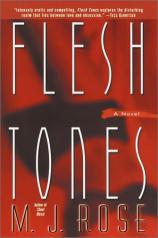Reading Group Guide
Discussion Questions
Flesh Tones

1. Genny says: "I'd built a life -- not admitting I'd built it on top of a shattered one. I'd learned my lesson about the kind of passion Gabriel and I had shared. No different than any narcotic, it brought both euphoria and destruction. I preferred living mid-range; no highs, no lows. And I swore that if he ever did come back to me, I'd keep my word and send him away."
How does Genny's passion fuel the book and push the story forward? How does her passion for Gabriel, mirror his passion for his art?
2. Many readers slides between thinking that, as the prosecuting attorney contends, Genny killed her lover intentionally, then, think the character is incapable of such a thing, and then back to thinking she might be guilty, after all. Did this technique work for you? At what point did you make up your mind as to whether Genny was guilty or not?
3. Flesh Tones grapples with what love is and what love requires of us. This is not the newly-married, happily-ever-after kind so common in fiction, but the all-too-real, long-term kind, full of shared history and the necessary compromises that break our hearts. How do you feel about a book that looks at this side of love? Was the author successful at painting a portrait of a doomed yet ultimately uplifting relationship?
4. Genny's mother is portrayed as a the epitome of self-control. Does this depiction belie the true woman?
5. Later in the novel, what is the significance of the Picasso that Genny chose from the gallery on her thirteenth birthday?
6. What was in Genny's background that would prepare her for a passionate affair with a man twice her age?
7. It has been said that M.J. Rose painted this novel, using a palette of only the most vivid colors. What are the may ways she uses art themes and metaphors to tell Genny's story.
8. There are several scenes, and allusions, to Genny saving Gabriel's life. Do you agree? And if so, what is the significance of this?
9. In the novel, Slade Gabriel is called "the consummate selfish artist", a man who "…pursued painting…fed on it…" Do you think he was? Did you think his talent gave him permission to be act the way he did and make the demands that he made?
10. Elizabeth Rosser, Gabriel's daughter, appears only briefly in the novel, yet her presence is a powerful one. In your opinion, what does the author intend to convey through this character?
11. Genny leaves Slade Gabriel alone to die. How can she do this and still convince anyone that she loved him?
12. There is an ethical issue at the heart of this novel - do you think Genny was right or wrong in helping Slade Gabriel to die? Do you think there is ever a good reason for the wrong thing even when it is for the right reason?
Flesh Tones
- Publication Date: April 29, 2003
- Genres: Fiction
- Paperback: 320 pages
- Publisher: Ballantine Books
- ISBN-10: 0345451058
- ISBN-13: 9780345451057







